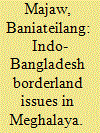|
|
|
Sort Order |
|
|
|
Items / Page
|
|
|
|
|
|
|
| Srl | Item |
| 1 |
ID:
141066


|
|
|
|
|
| Summary/Abstract |
This paper explores how the concept of ‘community policing’ has been understood and implemented in Tanzania. Whilst community policing is locally considered to be a very effective means of preventing crime and improving neighbourhood safety, the extent to which it constitutes a more accountable, responsive or ‘democratic’ form of policing, as assumed by proponents, is questionable. Based on research conducted in the city of Mwanza, this paper explains these outcomes in terms of continuities between forms of popular mobilisation that developed during Tanzania's socialist one-party era, and particularly the co-optation by the ruling party of sungusungu vigilantism, and understandings of the role of citizen participation in local development today. However, this paper suggests that as multiparty political competition becomes increasingly competitive, the sustainability of this model of community policing may be undermined, as citizens challenge the notion that they are obliged to provide resources for development directed from above.
|
|
|
|
|
|
|
|
|
|
|
|
|
|
|
|
| 2 |
ID:
152530


|
|
|
|
|
| Summary/Abstract |
Over recent decades, the demand for bottled water has grown exponentially at the global scale. In the marketing of such products, discourses of purity and paradise have often been invoked. Marketed as a ‘Taste of Paradise’, FIJI Water has gained enormous international success as an ostensibly clean and green product. Celebrity endorsements – reaching as high as US President Barack Obama – have abounded, driven in part by the belief that the corporation is both environmentally and socially responsible. This paper describes and analyses the rise of FIJI water and critically assesses the sources and impacts of its economic success. It goes on to explore its local social and environmental impacts in the context of a country that has been subject to waves of democratic crises where the fate of the polity has been influenced by FIJI Water's actions. FIJI Water has come to assume the role of development trustee in the villages most affected by the growth in exports. The democratic crises in Fiji has given FIJI Water profound developmental influence, and this has brought both costs and benefits at the local socio-environmental scale.
|
|
|
|
|
|
|
|
|
|
|
|
|
|
|
|
| 3 |
ID:
091573


|
|
|
|
|
| Publication |
2009.
|
| Summary/Abstract |
The recent moves towards the insertion of biofuels in the energy matrix of a number of countries are opening new prospects for agricultural production and for agroindustrial chains. The emergence of this new productive base raises new research issues: in what circumstances are the structuring, organization and implementation of these biodiesel productive chains taking place in Brazil? What are the effects of biodiesel production on local economies? Hence, the central objective of this study is identifying their economic and social impacts at the regions where they are installed. The analytical structure was constructed based on theories of regional and spatial economy: location coefficient, shift-share, theories of industrial location. A preliminary analysis identified that a biodiesel productive arrangement is emerging in the State of Piauí, Northeastern Brazil, with the purpose of stimulating regional development using alternative oil-bearing crops. However, the agricultural project in the town of Canto do Buriti/PI has faced problems of both a cultural and productive nature. Preliminary findings reveal productive, organizational, managerial and governance related difficulties and challenges that need to be faced when establishing a new productive base in a location that up to that point lacks a productive tradition.
|
|
|
|
|
|
|
|
|
|
|
|
|
|
|
|
| 4 |
ID:
177794


|
|
|
|
|
| Summary/Abstract |
Based on direct observation and primary local perspectives, this article examines experiences of cross-border movements in the borderland between Meghalaya and Bangladesh. It shows that the Indo-Bangladesh border is indeed an international border, but remains extremely porous for local people, with wide-ranging implications that raise theoretical issues about notions of ‘border’, but also prompt serious questions about local development, safety, security and citizenship in these peripheral borderlands.
|
|
|
|
|
|
|
|
|
|
|
|
|
|
|
|
| 5 |
ID:
167045


|
|
|
|
|
| Summary/Abstract |
Many government of developing countries show their commitment of reducing extreme poverty. A dominant thought considers that economic growth should be based on capital accumulation, productivity improvement, and access to international markets. This article tracts the system of assumptions that developing countries should meet to ensure that transfer models from developed countries could be efficient. We suggest a rebuilding of the transfer model by identifying some “structuring” conditions of developing countries, in particular by empowering universities to take a central role in the regional development process. From a poverty reduction perspective, the focus should be on the sustainability of local socio-technical systems, even if the options chosen are less efficient in the short term.
|
|
|
|
|
|
|
|
|
|
|
|
|
|
|
|
| 6 |
ID:
128158


|
|
|
|
|
| Publication |
2012.
|
| Summary/Abstract |
Local specialized markets and industrial clusters have been a driving force in China's transition from a rural to a market economy, as they have constituted a means for small local producers to access markets since the reform and the launching of the "open door" policies. In this article the industrial development of local industrial clusters endowed with specialized markets is outlined on the basis of fieldwork case studies in Zhejiang Province. In this area of China, tight linkages between the development of industrial clusters and specialized markets are based on social and economic foundations that have propelled the growth of market relations since the late 1970s. Together with local traditions and skills in both handcraft production and commerce, specialized markets accompanied the take-off of industrial clusters following the so-called "Zhejiang model" of development. The role of specialized markets is still crucial nowadays as a powerful channel for the distribution of consumer goods as well as a means of coordination of fragmented productions in China and abroad.
|
|
|
|
|
|
|
|
|
|
|
|
|
|
|
|
|
|
|
|
|